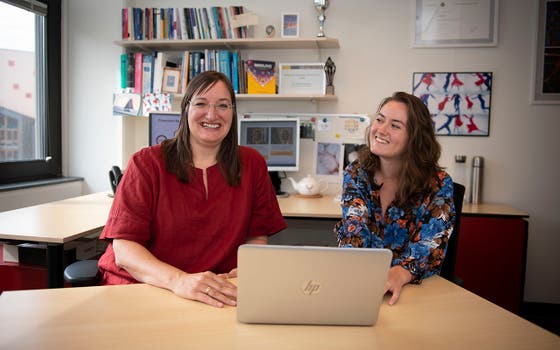Twenty years as a breeding ground for talent

Celebrating this twenty year anniversary along with the biomedical master’s programs is UMC Utrecht associate professor Kristin Denzer. As a lecturer and master’s coordinator since inception, she has seen many students grow to become a Master of Science and then leave the nest to embark on a career as a researcher, policymaker or science communications officers at universities and biotech companies in the Netherlands and far beyond. “These programs are a breeding ground of talent for our scientific research.”
“If one of our master’s students sends an e-mail to Harvard or Stanford University and says “I am from Utrecht”, that really opens doors for them. Scientists at these renowned universities really are aware of our master’s programs in Utrecht”, explains Kristin Denzer, associate professor at the Center for Translational Immunology at UMC Utrecht. With twenty-five years of service to UMC Utrecht and over twenty years as a lecturer of immunology, her contribution to education in Utrecht is significant. With self-deprecating humor she adds: “A real dinosaur”.
Breeding ground for talent
A large number of Master’s of Science have been trained by Kristin and her colleagues over the past twenty years. “Some of our 350 alumni have returned to UMC Utrecht to obtain their PhD, or to work here as a researcher or an associate professor with their own research group. We also regularly see alumni returning as policymakers or science communications officers. The master’s programs are a fantastic breeding ground of talent for research in general, but also for UMC Utrecht.”
Network to open doors for students
In addition, many students find jobs at universities and biotech companies, both nationally and internationally.” The foundations are laid during the program, because many biomedical students complete six months of research in a foreign country as part of their two-year master’s degree. “This exchange and contacts with colleagues at home and abroad really contributes to the strengthening of our research network. Conversely, we use our network to open doors for students. We are even able to do this at the most prestigious universities in the world.”
Twenty years of biomedical master’s programs
The biomedical master’s programs of Utrecht University started exactly twenty years ago, in September 2002. From that moment forward, students no longer graduated with the title of “doctorandus”, but as a Master of Science. The biomedical master’s programs taught in English at the Graduate School of Life Sciences usually focus on aspects that align directly with the six research spearpoints of UMC Utrecht. Lecturers for the programs are scientists from UMC Utrecht, who teach about the latest developments directly from their expertise.
Training in lecture room and laboratory
Kristin Denzer’s master’s program Infection and Immunity has also been up and running for twenty years now, something that Kristin – as a lecturer and the only master’s coordinator that has been around since inception of the program within UMC Utrecht – is very proud of. “The contribution by lecturers from UMC Utrecht to this master’s program in the lecture rooms, but more specifically through the training provided in the lab, is vital to ensuring that we can guarantee this high level of education. I am now seeing alumni who are mentoring the newest generation of students in their development as young researchers. And these supervisors are often nominated as supervisor of the year, which is great to see.”
Incredibly proud
The field of immunology took center stage during the Covid-19 pandemic. Kristin: “The misinformation about Covid was spreading more quickly than the virus itself. So it was important for the science community to give people the correct information: how does the virus spread? How do vaccines work? And how does the science work?” Alumni from Infection and Immunity also played a role in this. For example, Alex won a global competition about science communication. Her winning presentation explained the interaction between the immune system and viruses. “When the Omicron variant popped up, she was able to share new information in a blog for the general public within a week. As you can imagine, that makes me feel incredibly proud.”
Where their strengths lie
Offering students guidance in their choices during the study program is an important part of Kristin’s work. Students are given the opportunity to find out what their passion is. “By asking them a number of questions during conversations, I am able to help them to uncover their strengths, what makes them happy. In short, what they really want to be doing. About 70 to 75 percent of our students progress to PhD studies, which is exceptionally high within the Graduate School of Life Sciences. But we also have people who go on to work in consultancy or as a policymaker. This allows them to contribute to the policy-related aspects of the field and the health economy.” For example, alumna Kirsten Koymans, who is now an assistant professor and policy officer for the Graduate School of Life Sciences. “Kristin’s passion for education is clear to see – her enthusiasm is contagious! Starting during the master’s program, but also during my first years as a lecturer, she really inspired me and I have learnt a great deal from her! To this day, I experience the benefits of this in my work as a lecturer and policy officer in UMC Utrecht.”, according to Kirsten.
Alumni are after her job
Some alumni are secretly after her job. But retirement is not something that “dinosaur” Kristin is even considering yet. “Not a chance! My work is so cool. I want to continue for a while yet. I have now appointed a junior lecturer in my team, who uses her experience as a student to boost the quality of the contents and structure of our courses. So I spend four days a week working together with one of my own alumni on the development of education. Someone who I trained is now working with me as a full-fledged young colleague. That makes me truly happy.”
